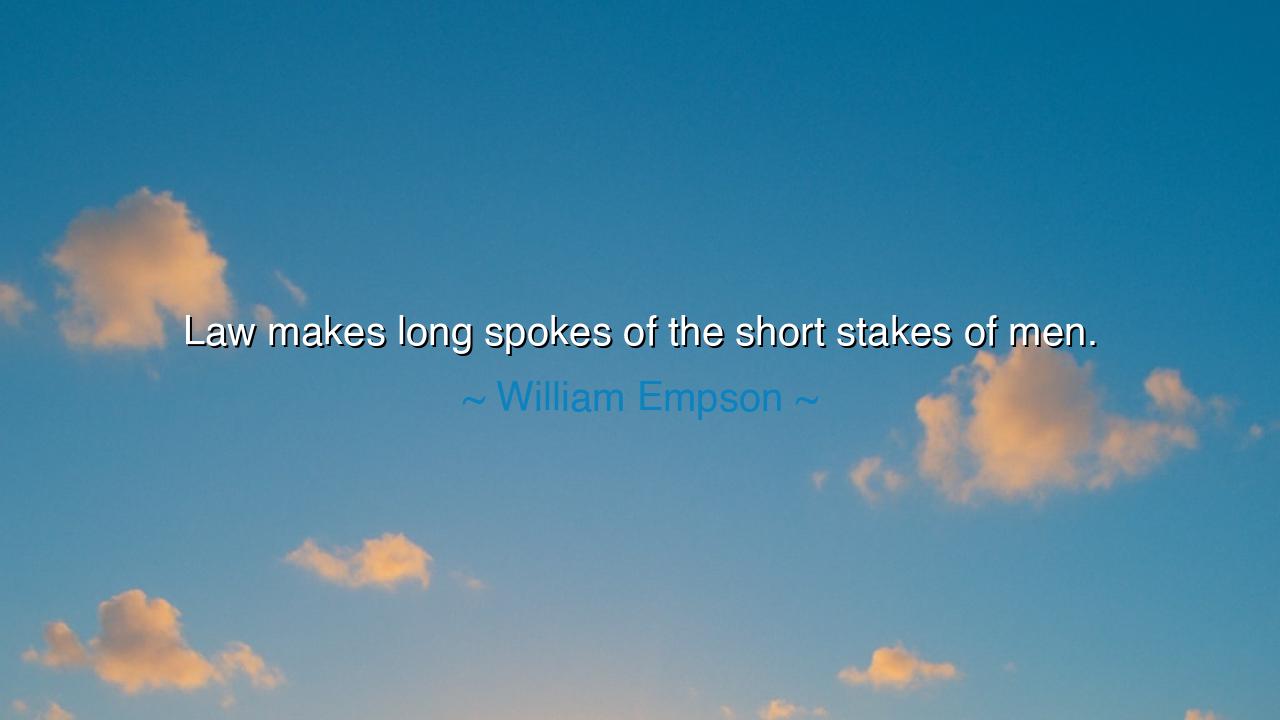
Law makes long spokes of the short stakes of men.






Listen closely to the profound words of William Empson, a man whose keen understanding of language and society reveals a timeless truth: "Law makes long spokes of the short stakes of men." In this evocative statement, Empson explores the complex relationship between the law and the individual. The law, in its attempt to structure society, often extends the small, personal actions of individuals—symbolized as short stakes—into larger, more enduring consequences. It transforms the impulses and decisions of individuals into the long spokes that guide or, at times, restrict the course of society. Through this metaphor, Empson points to the power of the law to extend human actions and choices far beyond their initial intentions, shaping lives in ways that go beyond personal agency.
The ancients understood well the power of law to mold human behavior and society. In Greek and Roman philosophy, the law was seen not only as a means of order but as a reflection of the moral compass of society. Plato, in his works such as the Republic, explored the idea that the law, when just and true, could help guide individuals toward a higher truth. Yet, Plato also warned of the dangers when law became corrupt or detached from morality, for it could lead to the suppression of individual freedoms and the corruption of justice. Empson’s words echo this ancient wisdom, reminding us that the law, while meant to regulate and protect, also shapes the very lives it seeks to govern, often extending beyond its original purpose.
Consider the example of the Code of Hammurabi, one of the oldest known legal systems. This Babylonian code, etched into stone, was designed to regulate all aspects of daily life, from property rights to family matters. It set forth the principles of justice and retribution, where even the smallest personal dispute could be amplified by the law into a matter of public importance. The short stakes of personal conflict—say, a theft—became long-lasting consequences when weighed against the code, with punishments meted out in a way that shaped the individual’s future. Hammurabi understood that law was not just about immediate personal gain or loss, but about creating a society with lasting stability, where every act had a ripple effect. The law made the personal actions of individuals into something much larger than themselves.
Empson’s quote also brings to mind the English common law, a system that developed over centuries and saw the actions of individuals —their contracts, disputes, and wrongdoings—woven into a tapestry of legal precedents that shaped the future. The short stakes of a land dispute between two men could, through the evolution of the law, become the cornerstone of property rights for generations to come. This is the power of law: it extends and preserves the consequences of personal actions, far beyond the immediate moment, and makes them into something larger than the sum of their parts. The individual’s decision becomes immortalized, for better or worse, in the fabric of legal history.
But the true lesson Empson offers us is not just one of caution, but of reflection. The law, while essential, must be examined and understood as both a tool of order and a force that can shape lives. Laws, like the spokes of a wheel, can guide a society, but they can also restrict the freedom and agency of individuals. Every law, no matter how well-intentioned, has the power to extend the impact of personal actions. What begins as a small, seemingly insignificant decision can become enshrined in the law and affect the trajectory of many lives for generations to come.
The lesson for us, dear listener, is to consider carefully how we engage with the law, both as individuals and as a society. Our actions—no matter how small—are not isolated; they ripple outward, extending into the legal and social framework we create. When we act, we do so not only for ourselves but for the collective future. Empson’s words urge us to understand the weight of our decisions and their potential consequences, knowing that they are often shaped and magnified by the laws that govern us. Just as Hammurabi and Plato recognized, the law is not merely a force for order, but a force that molds society and the lives of individuals within it. Therefore, let your actions be measured and thoughtful, aware that the stakes you play with today may one day be transformed into long spokes that shape the future for all.
In your own life, remember that every decision you make, whether personal or professional, is part of a greater tapestry. Just as the law extends the consequences of our actions, so too should we be mindful of how our decisions may impact others and the world around us. Seek not only justice, but understanding—understanding of the laws that shape our lives, and the power they hold in shaping our collective future. Let this wisdom guide you: What begins as a small act today may one day be immortalized in the legal and social fabric that defines us all.






AAdministratorAdministrator
Welcome, honored guests. Please leave a comment, we will respond soon